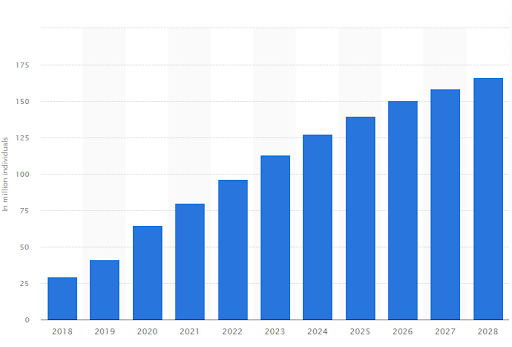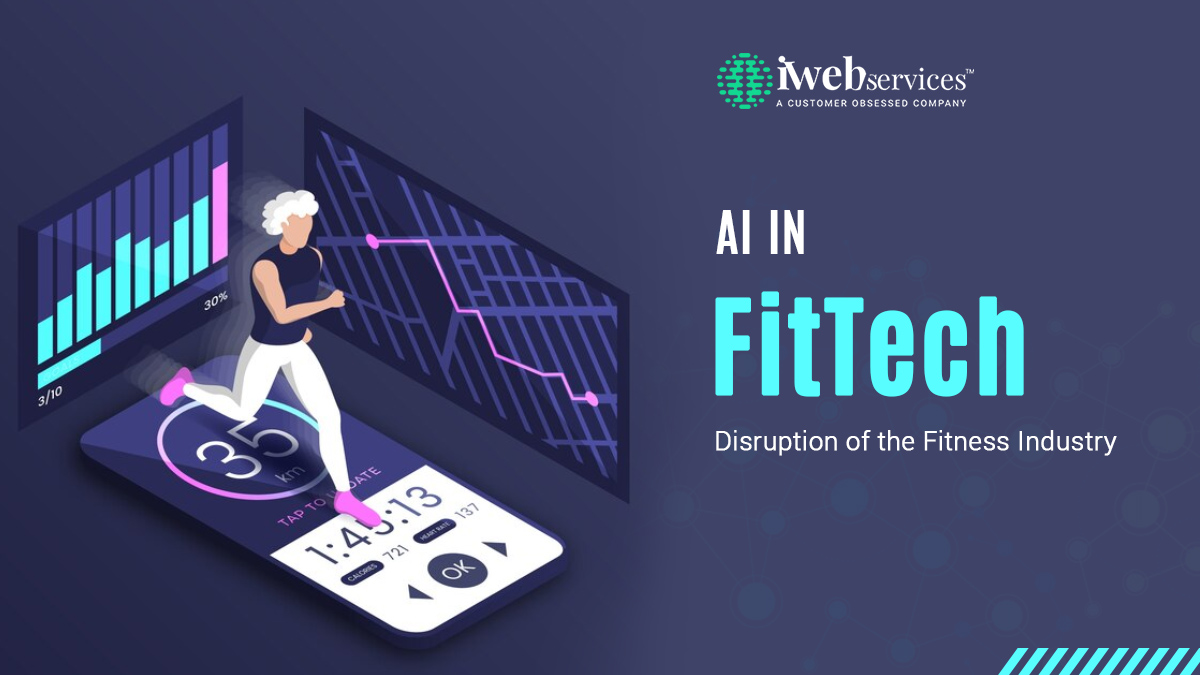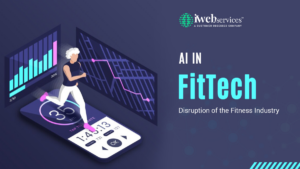Artificial Intelligence, or AI, has been around us for several years and is transforming industries as no one has ever imagined. The AI in FitTech, or fitness technology is playing a vital role in enhancing user’s fitness experience.
From analyzing the data gathered by smart fitness wearables to preparing an AI-driven diet plan that aligns with the user’s fitness goal, artificial intelligence is showing its capabilities and proving that it can take the fitness industry to the next level.
Therefore, in this blog, I have explained how AI in FitTech is disrupting the fitness industry. So, if you are curious to learn more about it, read this blog till the end and gain some useful insights.
Some Latest Statistics About AI in the Fitness Industry
Below are some of the current statistics that tell you about artificial intelligence in the fitness technology industry.

Source: Statista
- The global virtual/online fitness market generated $15.82 billion in revenue in 2022 and is projected to reach $256.97 billion by 2032, growing at a CAGR of 32.15% from 2023 to 2032.
- There will be 38.6 million users in the digital fitness and well-being segment of the digital health market in India between 2024 and 2028.
- According to reports, the wearable AI market was valued at $24.4 billion in 2022 and is predicted to exceed $252.4 billion by 2032.
These are some of the latest statistics that show the growth of artificial intelligence in the fitness technology industry in the coming years.
Artificial Intelligence in the Fitness Technology
In this section, you will learn how AI is being used in FitTech and disrupts the fitness sector.
AI is playing a vital role in transforming the fitness industry. AI developers are integrating the technology into fitness wearables, such as smart watches, armbands, smart rings, etc to deliver personalized fitness experiences tailored to user’s goals.
Here are some examples of how AI is being used in FitTech.
1. Personalized Training
Every individual is different, as are their fitness goals. Some people want to build a chiseled physique whereas some are looking forward to losing weight.
Artificial intelligence helps fitness enthusiasts achieve their fitness goals. The AI in fitness technology, such as wearables, gathers user data like weight, height, and fitness goals.
Later, it uses sophisticated algorithms and machine learning capabilities to create a custom training plan that is targeted toward the fitness goal of the individual.
Moreover, AI ensures that the training plans stay aligned with the individual’s rapidly changing needs, thus, it optimizes workout routines to deliver better results.
2. Predicting Potential Health Issues
Another way AI in FitTech disrupts the fitness industry is by analyzing the user’s behavior and their data through predictive analytics and recognizing patterns that may lead to potential health hazards.
AI can identify health risks beforehand and alert users about them. With this, users can make suggested adjustments in their lifestyles, like eating healthy food, or seeking medical help before it gets too late.
Also, AI and predictive analytics offer personalized recommendations that help users make informed decisions about their health and step forward toward a healthy life.
3. Enhanced Wearables
In recent years, fitness wearables have become a lot popular in the fitness industry. In fact, the global wearable fitness trackers market size was valued at $54.34 billion in 2023.
It is estimated to reach $230.56 billion by 2031, expanding at a CAGR of 18.5% between 2023–2031.
The smart fitness wearables integrated with AI algorithms collect, monitor, and interpret important health metrics, like heart rate, sleep patterns, and activity levels of the users.
These high-end AI algorithms evaluate the data in real-time and generate actionable insights that help users achieve their fitness goals. Using these insights, users can make changes in their current workouts or lifestyle patterns to lead a better and healthier life.
4. Data-driven Insights
AI in fitness technology also helps fitness experts and researchers understand various trends, patterns, and correlations regarding the fitness market.
Data analytics, a subset of AI, search through vast data and evaluate it to find these patterns and correlations.
These comprehensive data analyses provide actionable insights that not only enhance the effectiveness of fitness strategies but also allow for understanding individual health needs.
Overall, AI and data analytics help users make more informed and personalized wellness choices.
5. Virtual Coaching
Yes, AI-driven virtual coaching mobile apps and platforms leverage advanced artificial intelligence algorithms to provide training to users in real-time, no matter what location or schedule.
These AI-based trainers evaluate the user’s performance data and patterns to create a custom workout routine to ensure that users achieve their fitness goals efficiently.
Also, through these trainers’ interactive interfaces, users receive instant responses to queries, get advice to correct their techniques, and encouragement, to stay motivated and train injury-free.
6. AI-driven Nutrition and Diet Planning
Last but not least, AI also helps fitness enthusiasts to keep their nutrition in check. Nutrition is the key to optimal health and fitness, and AI offers proper guidance and empowers individuals to choose the right nutrition to fulfill their unique health objectives.
AI-driven nutrition and diet planning leverages advanced algorithms to analyze user’s health data, dietary preferences, and goals. By analyzing these data, it prepares personalized meal plans tailored to meet specific nutritional needs and optimize health outcomes.
Moreover, AI continuously learns and adapts based on user feedback and health progress, and optmizing recommendations over time.
In short, AI can be the nutrition expert that helps users build healthy eating habits, manage weight, and improve overall well-being.
Hence, these are some ways in which AI is used in FitTech and revolutionizes the fitness sector.
Benefits of AI in Fitness Technology
The following are the benefits of AI in FitTech:
1. Personalization and customization of workouts
The first and foremost benefit of AI in FitTech is that it can be the fitness trainer who can stay with the users 24/7.
This AI trainer can analyze the users’ data and their fitness goals, and create a custom training plan, helping them achieve these goals.
Not only this, AI can also optimize these workout plans as per the evolving needs of the users.
2. Performance Tracking And Real-Time Feedback
Artificial intelligence can track the user’s performance and offer them feedback in real-time. That’s the second benefit of AI in fitness technology.
AI gathers performance-tracking metrics from smart wearables, such as smartwatches and fitness bands, and analyzes these data.
Based on the results, AI provides recommendations that allow users to optimize their workout and diet plans and achieve their goals with ease.
3. Enhanced User Engagement And Motivation
When users start seeing results, they tend to be highly motivated to continue their fitness journey. And AI helps in keeping users motivated.
By providing custom workout plans and the right diet recommendations, AI helps users achieve their goals.
Moreover, it also interacts with the users during the workouts via audio-based virtual speeches to engage users and keep them motivated during training.
4. Provides Data Insights
Another benefit of AI in FitTech is it provides data insights that not only help users achieve optimal fitness but also fitness experts to understand what works best in the fitness sector.
AI gathers data and analyzes it to provide insights about users’ lifestyles and recommended changes. It also predicts potential health concerns that help users take action on time.
Additionally, AI helps experts in the fitness industry to analyze data of users and help them gain useful insights into the efficacy of different approaches and identify areas for improvement.
Therefore, these are the advantages of AI in FitTech. Now, read further to explore challenges and ethical considerations.
Challenges and Ethical Considerations
Here are some challenges and ethical considerations related to AI in fitness technology.
1. Data Privacy Concerns
In fitness technology, data leak is the major concern of users, and that is why many of them hesitate to share their personal and health data.
Therefore, it is crucial to protect sensitive health information and prevent unauthorized access.
One can use robust encryption techniques, ask for user consent for data usage, and adhere to data protection regulations such as GDPR to safeguard user data and win their trust.
2. Ensuring Inclusivity and Accessibility
Many times, issues arise that are related to disparities in access to technology. Hence, it should be addressed by considering diverse user needs.
The leading AI development services providers design user-friendly interfaces in apps and platforms and provide multi-lingual support to tackle such types of challenges.
3. Potential Biases
Potential biases are an ethical challenge in AI for FitTech that includes unequal access to resources and biased algorithmic recommendations.
Thus, the solutions for overcoming this challenge involve diverse data representation, rigorous testing for biases, and transparency in algorithmic decision-making.
Also, regular audits and involving diverse stakeholders help in ensuring fair and equitable results in fitness technology.
Therefore, these are some challenges and ethical considerations in AI in FitTech.
Future of the Fitness Industry With AI-Enable Fitness Technology
In recent times, AI has gained a lot of public attention. It is because of its unlimited potential to transform industries.
The fitness industry is also embracing artificial intelligence to enhance user’s fitness journey experience and help them reach their goals with ease.
You can witness the presence of AI in smartwatches, fitness bands, training platforms, and more. AI is there to provide custom training and diet plans, and gather, analyze user data, and provide useful insights that help them achieve their fitness goals.
So, if you also looking to develop an AI-driven fitness solution, you can reach out to a leading fitness app development company and share your idea. Their experts will guide you to develop your custom AI-enabled fitness app or platform tailored to your specific needs.
 April 9, 2024
April 9, 2024







